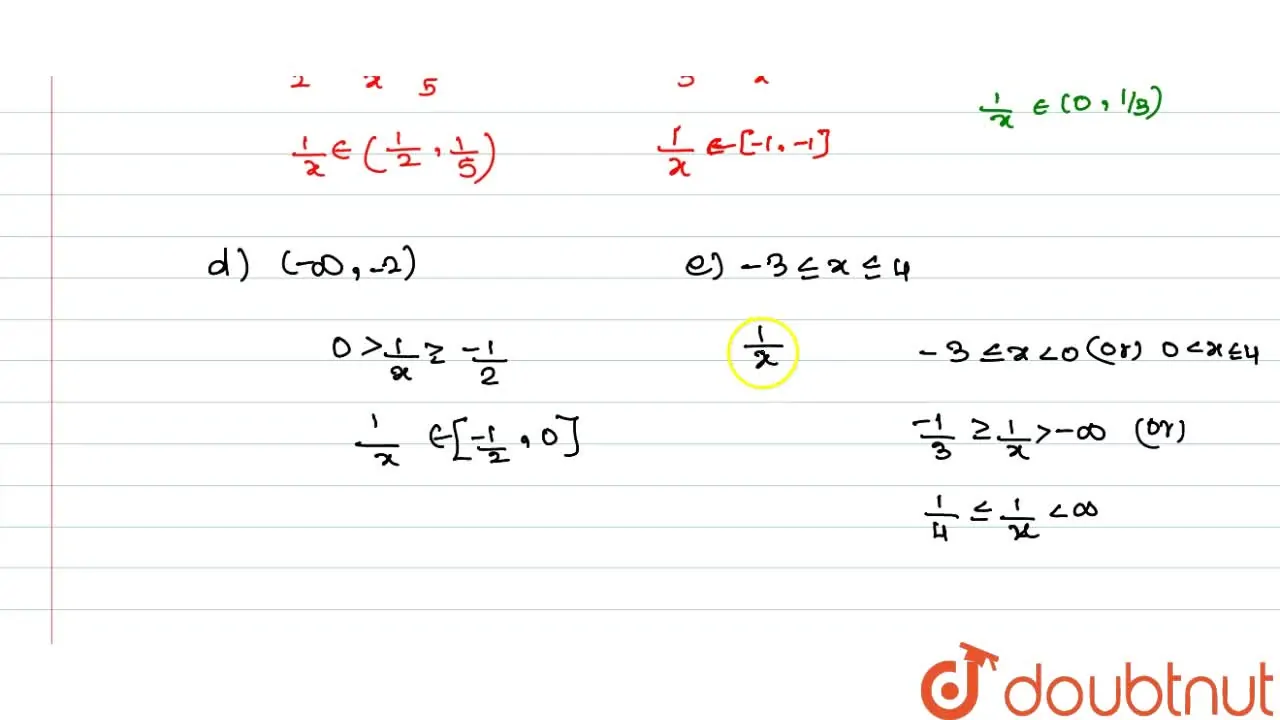Find the values of 1/x for the following values of x (2,5) (b ) [-5 ,-1] ( c) (d) ( e) Solution in Tamil
The correct Answer is:
and for
From (1) and (2)
Alternatively , now least value of is 0 which Greatest value of is 9 for x =3
(d)
Here least value of is 0 for x=0 and when x goes up to
( e)
Here least value of is 0 for x =0 for x=0 and when
Hence
Related Playlists
- BOOK - CENGAGECHAPTER - SET THEORY AND REAL NUMBER SYSTEM EXERCISE - Exercise 1.313videos
SET THEORY AND REAL NUMBER SYSTEM
- BOOK - CENGAGECHAPTER - SET THEORY AND REAL NUMBER SYSTEM EXERCISE - Exercise 1.411videos
SET THEORY AND REAL NUMBER SYSTEM
- BOOK - CENGAGECHAPTER - SET THEORY AND REAL NUMBER SYSTEM EXERCISE - Exercise 1.112videos
SET THEORY AND REAL NUMBER SYSTEM
- BOOK - CENGAGECHAPTER - SEQUENCE AND SERIESEXERCISE - Question Bank1videos
SEQUENCE AND SERIES
- BOOK - CENGAGECHAPTER - SETS AND RELATIONSEXERCISE - Question Bank3videos
SETS AND RELATIONS
Similar Questions
Solve x(3−4x)(x+1)2x−5<0
02:13View SolutionWhich is the following is always true ?
(a) If a<b, then a2<b2
(b ) If a<bthen 1a>1b
( c) If a<b, then |a|<|b|01:04View SolutionExamine whether A= { x:x is a positive integer divisible by 3} is a subset of B= { x:x is a multiple of 5, x∈N }.
03:21View SolutionLet a,b,c∈R+ and 2ab3+a2b3+b3=243 . If 2a+3b+2 assumes its least value, then a+b is equal to
02:50View SolutionLet n(U)=700, n(A)=200, n(B)=300 and n(A∩B)=100, then n(Ac∩Bc)=
View SolutionThe domain of definition of f(x)=√x+3(2−x)(x−5) is (−∞,−3]∪(2,5) (b) (−∞,−3)∪(2,5) (c) (−∞,−3]∪[2,5] (d) none of these
05:10View SolutionIf ex+ef(x)=e , then the range of f(x) is (−∞,1] (b) (−∞,1) (1, ∞) (d) [1,∞)
04:50View SolutionThe domain of the function f(x)=√(x+1)(x−3)x−2 is [−1,2)∪[3,∞) b. (−∞,−3)∪(2,5) c. (−∞,−3]∪[2,5] d. none of these
01:27View SolutionThe function f:A→B defined by f(x)=−x2+6x−8 is a bijection, if A=(−∞, 3] and B=(−∞, 1] (b) A=[−3, ∞) and B=(−∞, 1] (c) A=(−∞, 3] and B=[1, ∞) (d) A=[3, ∞) and B=[1, ∞)
02:37View SolutionFind the values of 1/x for the following values of x (2,5) (b ) [-5 ,-1] ( c) (3,∞) (d) (−3,∞) ( e) (−∞,4)
04:36View SolutionFind the values of 1/x for the following values fo x:
(a) (2,5) (b) [−5,−1) (c ) (3,∞)
(d) (−∞,−2] (e ) [−3,4]04:06View SolutionThe domain of the function f(x)=loge(log12|x−3|)x2−4x+3 is
(A) (−∞,4)−{3}
(B) (4,∞)
(C) (2,4)−{3}
(D) (−∞,4)−{1,3}03:40View SolutionThe exhaustive set of values of a for which inequation (a−1)x2−(a+1)x+a−1≥0 is true ∀x>2 (a)(−∞,1) (b)[73,∞) (c)[37,∞) (d) none of these
02:15View SolutionFind the value of x2 for the following values of x:
(a) [−5,−1] (b) (3,6) (c ) (−2,3]
(d) (−3,∞) (e ) (−∞,4)06:10View SolutionFind the values of 1/x for the following values fo x:
(a) (2,5) (b) [−5,−1) (c ) (3,∞)
(d) (−∞,−2] (e ) [−3,4]02:54View SolutionIf f(x)={x3,ifx2<1andx,ifx2≥1 then f(x) is differentiable at (a) (−∞,∞)−{1} (b) (−∞,∞)−{1,−1} (c) (−∞,∞)−{1,−1,0} (d) (−∞,∞)−{−1}
04:33View Solution


